- Home
- Lin Carter
The Nemesis of Evil Page 3
The Nemesis of Evil Read online
Page 3
The street has few pedestrians, for it bears no shops or food stores and goes nowhere, ending at the river itself. And if any of the few who do pass by chance to notice the sign, it would be reasonable to expect them to think nothing of it. The sign could easily denote that the building houses a chapter of one of those national college fraternities whose names are Greek letters.
Only a handful of highly placed city officials and federal agents are aware that this block of innocent and seemingly ordinary building fronts form but a thin façade, a mask behind which lies concealed a mystery that has been penetrated by only a few.
For behind this everyday façade is a single supermodern building, occupying the entire block, completely air-conditioned and with its own private source of power.
This block-sized building is the secret headquarters of the Omega organization, one of the smallest and least known but most powerful crime-fighting agencies in the world. An organization so small that it is composed of only five men and their mysterious Master.
Behind the front door of that building to which the brass plate bearing the omega symbol is affixed, is concealed a fantastic fortress guarded from entry or covert surveillance by every sophisticated means know to modern technology. Most of the doors on the block cannot be opened at all, and are only false panels set against the fabric of the walls. Those walls themselves could hardly be breached with ease, for the brownstone façade hides a triple wall of battleship steel, braced to resist anything smaller than a General Sherman tank. The front door of this building and of one or two others on the block, which seem to be ordinary painted wood, are built like bank vault doors, sheathed behind a thin veneer of wood. And the windows that face the street are not made of glass but of three-inch plastic, optically polished to be perfectly transparent, but tough enough to deflect machine-gun bullets.
Beyond the door with the brass plate lies a huge living room, appointed with every civilized luxury and decorated with faultless taste. Aubusson carpets cover the polished parquet floor, and the walls are hung with rare Flemish tapestries, mahogany bookshelves lined with thousands of volumes, and a superb collection of oils by Corot, Matisse, Rubens, and Velasquez worth millions.
Five men are disposed about the large, luxurious room awaiting the arrival of the sixth, who is their Master.
Pacing the carpet is a small, trimly built, peppery-tempered little fellow named Scorchy Muldoon. One look at his snub nose and broad upper lip, and eyes as blue as the lakes of Killarney under a thatch of fiery red, and you would have known him for an Irishman born and bred. Aloysius Murphy Muldoon was his full name; once he had been a champion bantamweight boxer famed for the speed of his fists, which fairly “scorched” the air, hence his nickname, coined by an admiring sportswriter. But that was years ago; Scorchy Muldoon had lost his temper in the ring, killing his opponent with the fury of his blows. Such accidents do occur in prize fights, but Scorchy, unable to forget that he had murdered a man, sought refuge in the bottle. In a whiskey-soaked haze he threw over his promising career and slid into the gutter, from which a strong hand had rescued him — the hand of the Master of Fate, whom he now lives only to serve.
Stretched out on a sofa is the lanky length of a gentleman with the pointed goatee, waxed mustachios, and arched ironic brows of Mephisto himself. His sallow skin, blue-black hair, and air of lazy, amused mockery lend him a curiously theatrical appearance, enhanced by his narrow pinstripe suit and natty gloves. He is Nick Naldini, master of sleight-of-hand, a former stage magician and escape artist who trod the boards of five continents as Mephisto the Marvelous. The tragic death of his wife and babe had plunged the mercurial Mephisto into a black depression, from which he found his only surcease in the deathly white powder called cocaine. His stage career wrecked, he turned to gambling with crooked cards, for those supple, long-fingered hands could stack a deck as easily as they could pick a pocket or crack a safe. From the slow death of cocaine as from a life of sordid crime, he had been saved by the strong hand of the Man of Mysteries to whom he has now dedicated the rest of his life.
Sprawled in an easy chair sits a tanned, frank, open-faced former crack test pilot and air ace, Francis “Ace” Harrigan. He downed forty enemy planes over Indochina, but a too-eager hand on the firing button had slain a novice airman of his squadron who happened to be the younger brother of the girl Harrigan loved with all his heart. Cashiered from the service, returned home, unable to bear the horror and loathing in her eyes, his reason cracked. From the very brink of suicide he had been salvaged by the wise counsels of the Lord of the Unknown, whom he now serves with all his ability.
At a Chippendale desk in the corner, flipping rapidly through a volume of facts and figures whose twelve hundred pages he could commit to memory in less than ten minutes, sits a huge, hulking, oafish-looking fellow with outsized feet and pale, freckled hands as big as boxing gloves, named Theophilus “Doc” Jenkins. With his heavy-jawed face, watery blue eyes, and wispy, colorless hair, he resembles an amiable halfwit. Few men would guess that behind his heavy-fleshed, dull-eyed visage is one of the most remarkable human brains in existence — for this man has the rare ability to remember instantly any face he has ever seen, any voice he has ever heard, any page he has ever scanned. The man with the camera eyes and the computer brain had been condemned to a mental asylum until redeemed by the wisdom of the Lord of the Unknown, whom he now calls Master.
Hunched over a sheaf of electronic diagrams, a skinny, frail little man sits in the corner, sharp peevish eyes in his waspish face intently fixed on the rapid scribblings of his pen. His arms and legs are so thin and fragile he looks as if you could snap him in two with your bare hands; however, the man rash enough to try would find himself being tied in painful knots by a wiry-muscled master of kung fu and karate. Few would recognize this skinny scarecrow for the scientific genius Mendel Lowell “Menlo’ Parker, who had been a wizard of electrical science, the peer of Tesla or Marconi, until struck down by a dread, wasting disease. From this incurable illness Menlo Parker had been cured by the surgical skills of the Ultimate Man at whose service he has placed all the resources of his brilliant intellect.
These five men, and the Master they love and serve with all the loyalty of their grateful hearts, comprise the Omega organization, which is dedicated to the destruction of those super-criminals who employ the clever tricks of modern science to prey upon the superstitious fears of the common man.
Scorchy Muldoon was getting restless. The peppery little bantamweight could rarely sit still for long, and was never so happy as when he was venturing into danger or wading into a fight.
“What’s keeping the chief?” he grumbled, pacing like a caged tiger. “He told us to be here by two; it’s now quarter past.”
“Relax; take it easy,” drawled Nick Naldini from his languid position on the sofa. “If he said he’d be here, he’ll be here. Anybody know what’s up?”
Menlo Parker cleared his throat, putting down his sheaf of diagrams and peering across them to where the magician lay sprawled lazily. “I have no idea, Nicholas, but the chief got a call from the Coast about noontime. From California, I think. Someone named Ryan —”
“Newspaper publisher,” rumbled Doc Jenkins from the desk in the corner. “A man of considerable wealth and influence in Los Angeles, I believe.”
“You ‘believe,’ is it, me bucko?” grinned Scorchy Muldoon. “Don’t be after pullin’ our leg, you big galoot! You could probably reel off his holdings to the last penny, and quote his Social Security number to boot.” The big, heavy-jawed man with the stupid-looking face grinned at him amiably, and shuffled his Size 14s embarrassedly.
“Here’s the chief now,” observed Ace Harrigan alertly. They turned to greet their Master.
The man who now entered the room from his secret sanctum beneath the city greeted them with a nod. To the eye he seemed an ordinary-looking figure. At a couple of inches over six feet, he was only a trifle above the average height. Although his body was super
bly muscled — was, in fact, one of the most perfectly developed physiques in the world with a symmetrical build and evenly developed musculature — he seemed nothing more than a healthy, athletically inclined man of perhaps thirty.
It was only at second or third glance that you found something about him that arrested your attention. Perhaps it was the strange, tawny shade of his skin, which was not precisely that of an Oriental, but seemed more Polynesian than anything else. Or it could have been the classic regularity of his features, which were handsome without seeming effeminate, and whose impassive and majestic immobility was like a mask. Scorchy Muldoon often thought, irreverently, that his chief would have made a great poker player with that face, if the Ultimate Man ever cared to indulge in such frivolous forms of entertainment.
The attention of most who saw the chief was drawn at once to the breadth of his nobly proportioned brow, which denoted a highly developed brain many times superior to the most brilliant intellects of which the planet could boast. Either that, or his eyes were likely to seize and hold your fascinated gaze. These last were truly striking. Large, deeply set, and wide apart under that towering brow, they were orbs of scintillate, intense, jet-black magnetic fire. Those eyes could virtually hypnotize at a glance. Indeed, so hypnotic were they that their possessor commonly concealed them behind sunglasses when in public for just that reason.
He was neatly but oddly dressed in a turtle-neck pullover made of stretch fabric in gun-metal gray. Gray, too, was the supple suede jacket and slacks he wore. His shoes were also of gray suede, a color which, for some peculiar reason, he seemed to favor inordinately. His hair was of the same precise shade, sleek and heavy and smooth, with locks arranged across his brow in a fashion reminiscent of some of the ancient Roman portrait busts in the International Museum. Few beyond his five lieutenants knew that he was completely bald and that the pewter-toned hairpiece was false.
The reason behind this omnipresent gray monotone of dress was a complexly psychological one. Whenever he appeared in public, it was in this fashion. So distinct and unique an appearance did he present, for this reason, that people tended to think of him in this manner. That made a matter of personal disguise, whenever he chose to employ one, all the more effective.
And besides, this one was one of his “business suits,” as it amused Scorchy Muldoon and the others to think of them. Probably only a fully equipped police lab, with a couple of weeks at their disposal, could have discovered all the special gimmicks and gadgets cunningly concealed in what seemed at first and even at second glance to be an ordinary suit of clothing.
In a lifetime filled with suspense and peril and danger, he had seen it proved many times that the advantage of surprise can often carry the day against even overwhelming odds. For that reason, the Man of Mysteries took every precaution his brilliant mind could envision to protect himself and those who fought beside him in the unending war between supercrime and civilization.
Such a man was Zarkon, Lord of the Unknown, who addressed them now in quiet, vibrant tones that bore the steely ring of command.
“I called you together for a mission,” he said into the intent silence of the room. “In California, a man has been killed by a mysterious force. He was a good man, honest and intelligent, and devoted to uncovering crime in high places. Another man has asked for our assistance in exposing his killer and in rooting out what may be a secret criminal conspiracy. He, too, is a good man — a man of influence, wealth, and power who uses these faculties to crusade for good government and to search out criminality. We are going to his aid this afternoon. We will take the Shooting Star and equipment cases 9, 11, and 14.”
Scorchy Muldoon was the first of them all to break the silence.
“Oboyoboyoboy!” he grinned, blue eyes sparkling with anticipation. “It’s about time, too! I been spoilin’ for a good, hot brawl for ever so long.”
Prince Zarkon said nothing. But he had a feeling that, before long, the peppery little prize fighter would have his wish.
Chapter 4 — The Secret Brotherhood
The five men and their Master, together with their fighting gear and the equipment cases that Zarkon had specified, descended by an elevator into the sublevels of their headquarters. There a pneumatic tube carried them swiftly and secretly under the Henry Hudson River to a small private island midway between Knickerbocker City and the rocky cliffs of New Jersey.
Omega Island was so small it was found only on U. S. Department of the Interior geological survey maps. The entire island was the personal property of Prince Zarkon, and was protected from city, state, and federal interference because it was under the diplomatic immunity of the flag of Novenia, a small Balkan republic of which until recently Prince Zarkon had been ruler.
From the air, the small island appeared deserted save for some dilapidated shacks of corrugated iron and a rickety boat dock. Most of the Omega facilities were underground or concealed by clever camouflage. It was here that the Omega men kept their private planes and boats, among which were a luxurious yacht that packed the gun power of a pocket battleship, one of the most powerful privately owned submarines in the world, and a variety of speedboats and aircraft.
The underwater pneumatic tube debouched before another elevator, which took them to the surface. While Ace Harrigan prepared Zarkon’s private jet, the Shooting Star, for the flight, the other men loaded aboard their gear and equipment. Before very long they were ready for the takeoff.
The island was too small to have room for a regular runway such as are used by ordinary jet aircraft. But, then, the Shooting Star was not an ordinary plane. Zarkon had modified the design with a few improvements of his own, among which was a bank of rocket tubes that permitted the craft to take off almost vertically.
They strapped themselves into seats with inflated pneumatic cushions, fitted with hydraulic gear that absorbed most of the brutal thrust of the rocket tubes. With Ace Harrigan at the controls, the Shooting Star went soaring up from Omega Island and ascended to about twenty-six thousand feet. Leveling off at the altitude of five miles, the speedy little craft arrowed across the continent at a velocity that would have impressed the pilots of conventional jetcraft.
Once the flight was under way, Zarkon and his lieutenants unstrapped themselves and set to work. The Omega organization seldom went into action without advance preparations, which included the amassing of as much relevant information as could be assembled. Zarkon swiftly briefed his men on the situation. Radiophones were built into the cabin by each seat, and while Nick Naldini inquired into the ownership, structure, and affairs of the secret occult Brotherhood the murdered reporter had been investigating, the others did similar research, quickly compiling dossiers of relevant information on all individuals thus far known to be connected with the case. By early afternoon they began to make their reports to Zarkon.
Ryan’s wealth was sizable and entirely accounted for by the success of his newspaper empire; no law-enforcement official from the U. S. Attorney General to the Los Angeles district attorney had any reason to suspect him of surreptitious or criminal activities.
“But, cripes, we knew that already,” grouched Scorchy Muldoon under his breath to Nick Naldini. “I mean, heck, isn’t he the guy we’re goin’ out to help?”
“Maybe so, boy,” drawled the former magician sardonically. “But it wouldn’t be the first time the master crook behind a scheme called loudly for an investigation, just to keep out of suspicion.”
As for the cult, the Los Angeles Chamber of Commerce reported that it was a legally registered religious enterprise, chartered under the corporate laws of the state, and owned by a number of individuals whose names were unfamiliar even to the computer memory of Doc Jenkins. Follow-up checks on these names with the FBI disclosed that none of them possessed criminal records — at least not under the names that appeared on the corporation papers.
The Better Business Bureau, said Menlo Parker, recorded upward of a dozen complaints against the so-called “Brotherho
od of Lemurian Wisdom” that ranged from the making of fraudulent claims down to veiled attempts at monetary coercion. The Bureau, unfortunately, operated only in an advisory function and could not institute investigations. The same sort of complaints, the Bureau head reluctantly admitted, had been listed at one time or another against half the medical quacks, faith healers, phony cults, and mail-order occult schools in the state of California; they were accustomed to this sort of thing, and the situation was nothing new to them.
Both the federal authorities and the local police agencies had nothing whatsoever on Gordon Halleck, the managing editor of Robert Russell Ryan’s Los Angeles paper. Halleck had worked on one or another of the several papers in the Ryan newspaper syndicate for thirty years. And as far as they knew, he was completely straight and always had been, they said, giving the editor a clean bill of health as far as their criminal files went.
The leader of the Brotherhood was a man known as Lucifer. This was the only name by which he was known to his followers, and although it was obviously a nom de plume, they had no information as to his true legal name or identity. No one knew which of the several names on the corporation papers was his.
The nearest major city to Mount Shasta was the metropolis of Palma Laguna. In an exclusive suburb of Palma Laguna known as Seagrove, Robert Russell Ryan had his country estate. There Russell maintained a private jet and his own airfield, so it was convenient for Ace Harrigan to bring the Shooting Star down at the private field and house it in one of the hangars. Servants on Ryan’s staff unloaded their gear and escorted them to the house, a rambling estate house in the Georgian style, brick walls covered with ivy. Ryan himself met them in the study. A tall, lean, distinguished-looking man, with aristocratic features and piercing gray eyes, he unerringly picked out their leader from among them, although Zarkon had seldom allowed himself to be photographed.

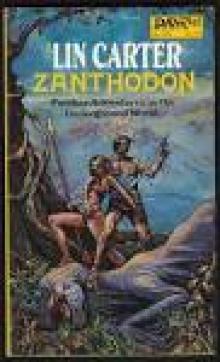 Zanthodon
Zanthodon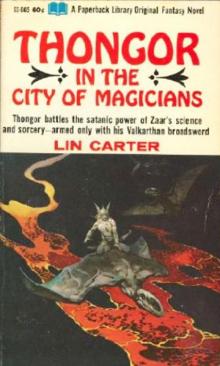 Thongor in the City of Magicians
Thongor in the City of Magicians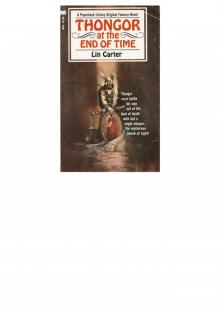 Thongor at the End of Time
Thongor at the End of Time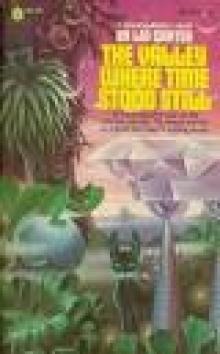 The Valley Where Time Stood Still
The Valley Where Time Stood Still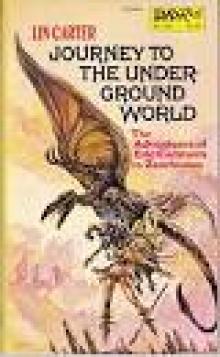 Journey To The Underground World
Journey To The Underground World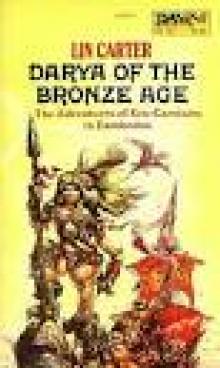 Darya of The Bronze Age
Darya of The Bronze Age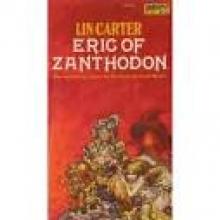 Eric of Zanthodon
Eric of Zanthodon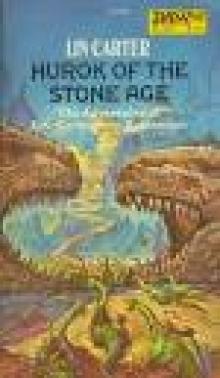 Hurok Of The Stone Age
Hurok Of The Stone Age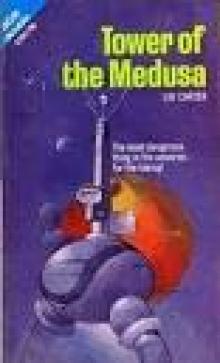 Tower Of The Medusa
Tower Of The Medusa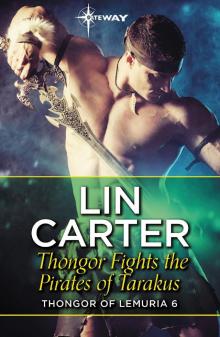 Thongor Fights the Pirates of Tarakus
Thongor Fights the Pirates of Tarakus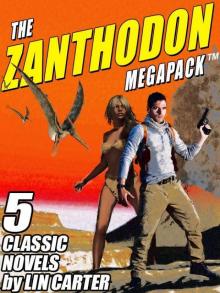 The Zanthodon MEGAPACK ™: The Complete 5-Book Series
The Zanthodon MEGAPACK ™: The Complete 5-Book Series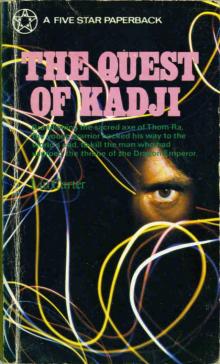 The Quest of Kadji
The Quest of Kadji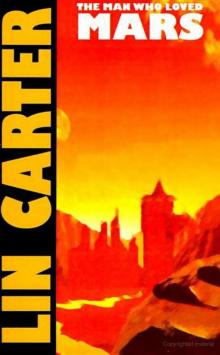 Lin Carter - The Man Who Loved Mars
Lin Carter - The Man Who Loved Mars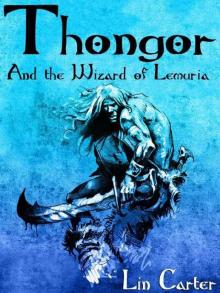 Thongor and the Wizard of Lemuria
Thongor and the Wizard of Lemuria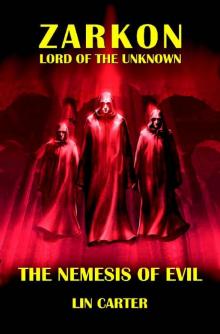 The Nemesis of Evil
The Nemesis of Evil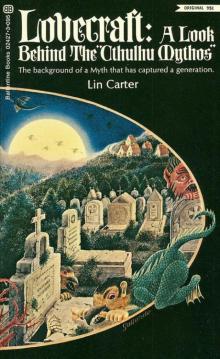 H.P.Lovecraft: A Look Behind Cthulhu Mythos
H.P.Lovecraft: A Look Behind Cthulhu Mythos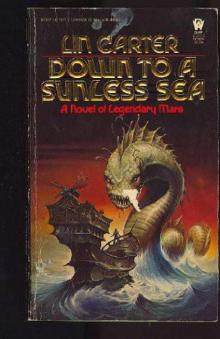 Lin Carter - Down to a Sunless Sea
Lin Carter - Down to a Sunless Sea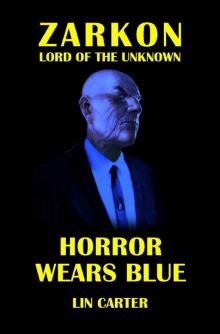 Horror Wears Blue
Horror Wears Blue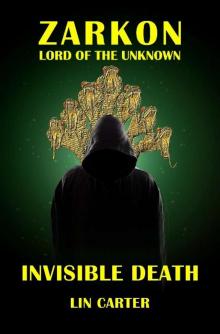 Invisible Death
Invisible Death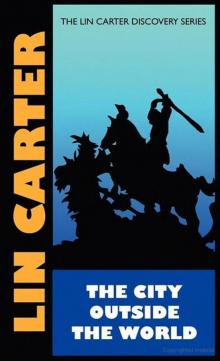 Lin Carter - The City Outside the World
Lin Carter - The City Outside the World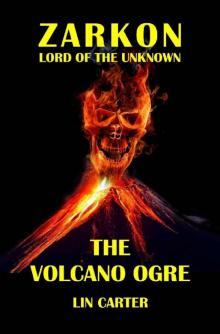 The Volcano Ogre
The Volcano Ogre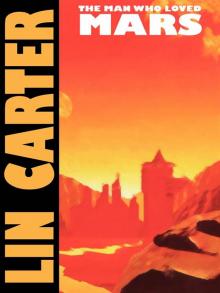 The Man Who Loved Mars
The Man Who Loved Mars